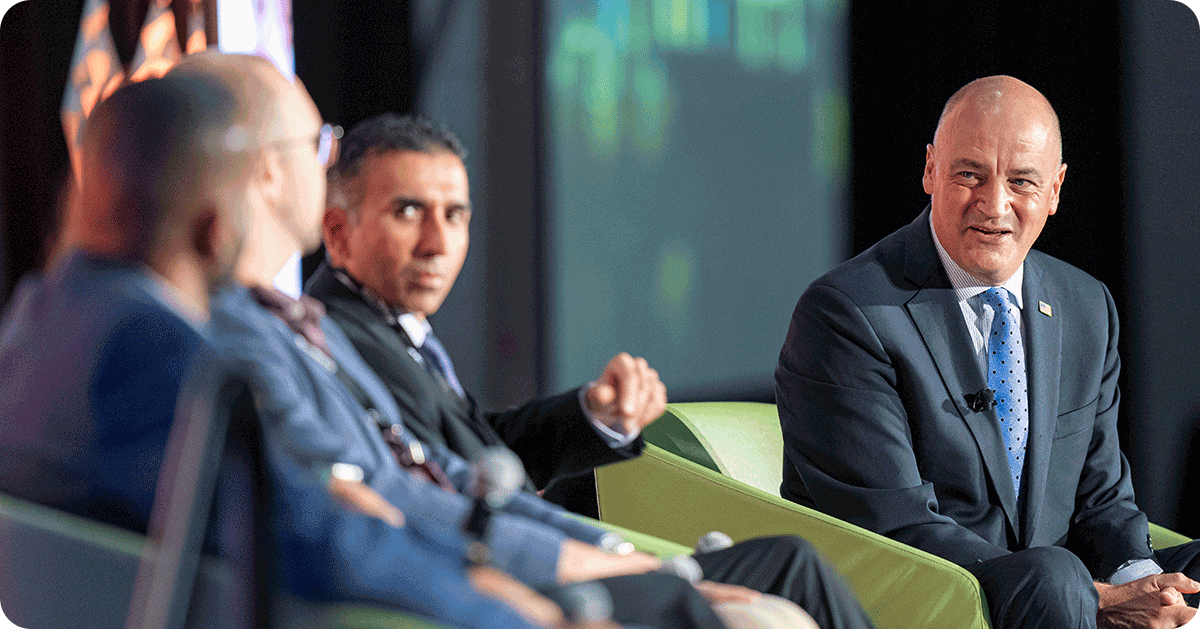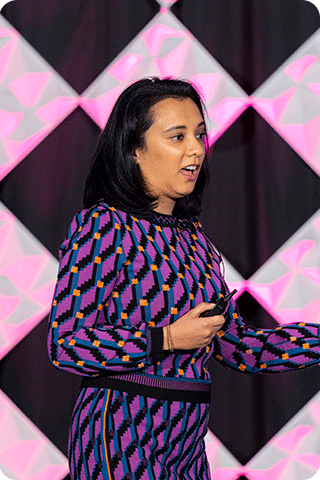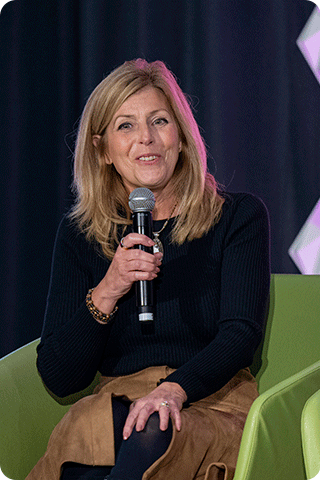
Summit examines innovation, AI’s place in Wisconsin economic development

Matt Kirchner (right) hosts the panel dicussion: Thriving with AI: How Wisconsin Businesses Are Leading the Future
The Wisconsin Economic Summit 2024 convened a mix of next-generation thinkers, technologists, and entrepreneurs to share their insights on powerful innovations and the revolution of artificial intelligence (AI).
At the two-day gathering hosted by WEDC at the La Crosse Center last month, participants learned how technology makes cancer detection more effective, how chambers of commerce can reach their goals through innovation, how AI is remaking the entrepreneurial landscape, how the arts can fuel economic growth, and much more.
“The goal of the Wisconsin Economic Summit, I would say, is to get people to think—and to think differently and to learn things,” said Missy Hughes, WEDC secretary and CEO. “It gives us the opportunity to think about how we can take those things into our work as we support Wisconsin and think about the Wisconsin economy.”

Jyoti Gupta, President and CEO, Women’s Health and X-Ray, GE Healthcare
One of the third annual summit’s themes was innovation and how it drives community and business development.
At GE Healthcare, Dr. Jyoti Gupta, president of women’s health and X-ray, said engineers designed new mammography imaging systems that gave patients more control and comfort, which eased their anxiety and could encourage more women to have mammograms.
“Our goal was to bring in empathy and humanize the mammography experience,” Gupta said.
Gupta added that that more than 90% of women tested on the Senographe Pristina™ system said they were not anxious at all or were less anxious. Wisconsin-based GE Healthcare also found a way to improve the imaging of dense breasts, where 70% of cancers are found. The firm worked on a technology called contrast-enhancing mammography that uses the same machine but introduces a contrast element that reduces the masking effect of breast tissue, enabling easier diagnosis.
At the local level, innovators were also hard at work. The Fox Cities Chamber of Commerce created a first-in-the-nation program called Connect Free, which changed its membership model. The program provides free membership to small businesses with five or fewer employees, nonprofits with 10 or fewer employees, and all free-standing restaurants, so that all these businesses have access to a suite of supports from the chamber.

Becky Bartoszek, President and CEO, Fox Cities Chamber
“Wrapping our arms around our small employers as a community and giving them resources at their most fragile time has helped many of these businesses grow,” Becky Bartoszek, the chamber’s president and CEO, said. “The YMCA has added onto our program; Network Health has added onto our program. It’s amazing what a community can do to move the needle.”
The chamber’s model has been adopted by places including Buffalo, N.Y., and Overland Park, Kansas. In fact, Bartoszek said 4% of chambers nationwide have followed her organization’s lead.
A panel of artists also called for more strategic integration of the arts into Wisconsin’s economy.
“The artists in my world, throughout every continent on the planet, are underfunded,” said John Riepenhoff, executive director at Sculpture Milwaukee. “The value of the qualities of the artists in my community aren’t being met with economic reinforcement.”
He added: “There is not a good access point right now between artists and business leaders. We need to understand what you see in the value of art; we need to articulate what we see, and where we can help each other.”

John Riepenhoff, executive director at Sculpture Milwaukee
The summit also tackled the question of how AI is reshaping companies and workplaces. Matt Kirchner, president of ATS/LAB Midwest and host of the TechEd Podcast, told participants that Wisconsin needs to adopt a “just start” approach to using AI, rather than waiting for technical perfection.
A number of entrepreneurs details the benefits of the technology and how it is helping them innovate. And while some worry over the affect AI will have on jobs, Kirchner attempted to allay those fears.
“If you’re a professional dancer, if you’re a roofer, if you operate a pile driver, the news is really good for you because your job is not going to change,” he said. “But the rest of us will see significant change. Will I lose my job? The answer to that question is no. But you will likely lose your job to somebody using artificial intelligence if you’re not using it.”
And Pete Dulcamara, founder of Pete Dulcamara & Associates, made the case for a humanity-centric economy, one that creates businesses focused on solving global problems.
Regional collaboration is crucial to tap the potential of technological growth in Wisconsin, Dulcamara said. Similar to North Carolina’s Research Triangle or the Silicon Valley, the state’s metro areas in the Fox Cities, Milwaukee area, and Madison area can achieve that sort of economic muscle, he said.
“If we were able to link those three areas together in an innovation triangle, I think we would be in the top 10 within the United States to drive innovation,” he said. “Then we can really drive this idea of providing every single Wisconsinite the opportunity to thrive.”
Distribution channels:
Legal Disclaimer:
EIN Presswire provides this news content "as is" without warranty of any kind. We do not accept any responsibility or liability for the accuracy, content, images, videos, licenses, completeness, legality, or reliability of the information contained in this article. If you have any complaints or copyright issues related to this article, kindly contact the author above.
Submit your press release